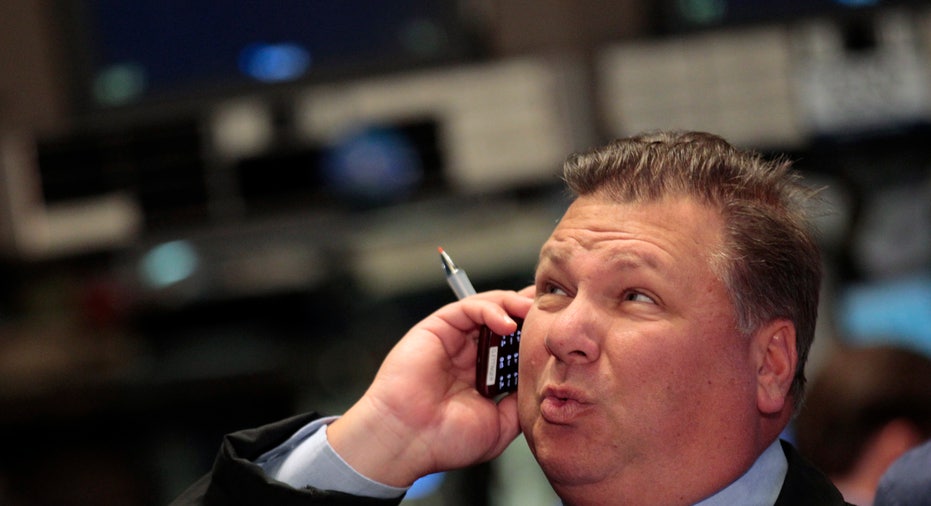Wall Street Drops After China's Surprise Currency Move

A surprise move by China to devalue its currency had traders in the U.S. questioning how it might affect the Fed’s path to raising interest rates as global growth worries were reignited.
The Dow Jones Industrial Average was 210 points lower, or 1.20% to 17403. The S&P 500 declined 19 points, or 0.95% to 2084, while the Nasdaq Composite shed 65 points, or 1.27% to 5036.
The energy sector pared losses late in the session, while the materials led the way lower, falling 1.91%. The utilities and telecommunications sectors ended in positive territory.
Today’s Markets
Overnight, the People’s Bank of China lowered the value of the yuan 1.9%, the biggest drop in more than two decades. The move sent the currency to a three-year low against the U.S. dollar, and was seen as a way for the nation to help spur more action in its export economy after a string of weak data, It also comes on the heels of previous strategic moves by the nation to prop up its struggling economy.
Brad McMillian, chief investment officer for Commonwealth Financial Network, said he believes the move by the Chinese central bank was intended as a sign of strength, but he, and the rest of the market, sees it as weakness.
“China always had a rational long-term approach to policymaking. When it came to their currency approach they‘ve always kept it at a consistent level with no surprises, and managed it with long-term interest. The fact they dropped this bombshell begs the question as to why,” McMillian said.
He explained China likely needed to be seen as “in charge” of the market, especially after the botched reaction to the plunge in its stock market last month, and that the nation is worried about economic growth to a point they’re taking serious action with the expectation that the downside risk will be worth it in the end.
“I don’t think it will be,” McMillian said. “For this to have a meaningful impact on Chinese exports, the currency will have to depreciate a lot more, and that’s how we’ll know if [the export economy] was the primary motivation behind it. They probably need to go another 10% - 15% lower, but the political consequences would be enormous if that happens.”
Chinese stocks were mostly flat after the central bank’s move. The Shanghai Composite index ended down 0.01%, while Hong Kong’s Hang Seng fell 0.09%, and Japan’s Nikkei dropped 0.42%.
The U.S. dollar rose against most major world currencies. Against the yuan, the greenback climbed 1.86% to 6.33. Meanwhile, the yield on the benchmark 10-year U.S. Treasury fell 0.117 of a percentage point to 2.121%
It wasn’t just equity markets feeling pressure, commodities markets also dipped into negative territory as the move from the PBoC helped make commodities priced in dollars more expensive.
After jumping in the prior session, U.S. crude oil plunged 4.18%to $43.08, settling at its lowest level in nearly 6-1/2 years. Meanwhile Brent, the international benchmark, declined 3.07 % to $48.86.
Gold, largely seen as a safe-haven asset, gained 0.31% to $1,107 a troy ounce, while copper settled at its lowest level in five years after it shed 2.76% to $2.41 a pound.
European markets followed Asia lower as traders there split focus between China’s currency moves and a looming deal between Greece and its creditors for its third financial aid package. The Euro Stoxx 50, which tracks large-cap companies in the Eurozone, dropped 1.90%. The German Dax sank 2.68%, the French CAC 40 declined 1.86%, while the UK’s FTSE 100 fell 1.06 %.
Greece said on Tuesday that after 23 hours of negotiation, it reached a deal with its international lenders for a multi-billion euro bailout. The deal must still receive a blessing from the nation’s parliament before moving on for approval from eurozone finance ministers to meet its 3.2 billion euro debt payment to the European Central Bank by August 20.
Meanwhile, back in the U.S., traders are digesting a slew of corporate news headlines including Monday night’s surprise announcement from Google (NASDAQ:GOOGL). The Internet-search giant said it created a new parent company called Alphabet that will house a collection of Google’s non-search businesses including Nest, Google Ventures, and Google X. Alphabet will replace Google as the publicly-traded entity, but the tickers will remain the same.
Fed commentary from the central bank’s No. 2 man, Stanley Fischer, drove big gains in the prior session, and traders continue to look to economic data for clues as to when the central bank will begin to hike short-term interest rates.
Still, Barclays analysts said it appeared the Fed is working to keep market expectations for a rate hike in check as many of its members speak ahead of the September meeting.
“Over the past two weeks, whenever the market-implied probability of a September rate hike has risen, a Board member has come forward in an effort to tamp down market expectations…we read the Vice Chairman’s comments as an attempt to retain optionality over policy,” they noted.
The investment bank still sees the first hike in September, but said there’s still risk that criteria to raise rates could shift before then.
The economic-data calendar was sparse Tuesday with only a handful of reports for traders in the U.S. to digest. The National Federation of Independent Businesses reported small business optimism bounced back in July from a 15-month low. Meanwhile, the Labor Department said non-farm productivity also rebounded in the second quarter, but the first quarter output was revised lower, renewing concerns inflation could pick up more quickly than expected.
Symantec (NASDAQ:SYMC) said itplans to sell its data-storage unit to private-equity group Carlyle for $8 billion. The announcement came in the antivirus software company’s second-quarter results which were originally due out after the close of trade.



















